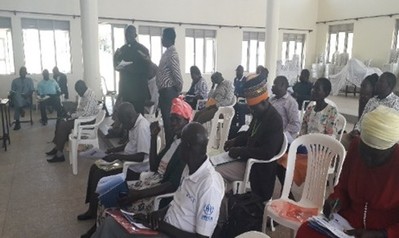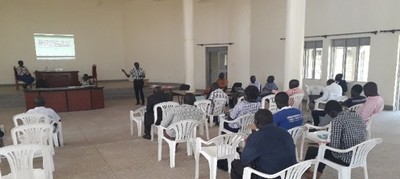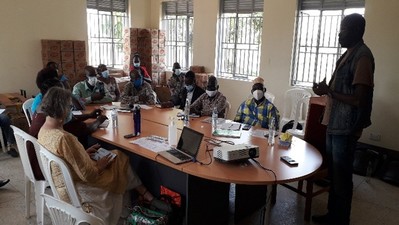
Blog: Integration of Palliative Care in Adjumani Hospital: A Report by Vicky Opia
![]() Cameron Don
Cameron Don
![]() 31st March 2025
31st March 2025
Vicky Opia, a palliative care nurse specialist and one of our Cairdeas scholars, writes on the integration of compassionate palliative care practises into Adjumani Hospital in Uganda. Vicky takes us through the journey she and her team took, highlighting the importance of training existing staff, building relationships with district stakeholders and engaging with the community to raise awareness and reduce stigma. Vicky tells us about the impact the integration of palliative care has had on the local community, particularly for the refugee communties living in and around Adjumani, and looks to the future with intent to grow and develop palliative care services in Adjumani and beyond.
My journey: Integrating Palliative Care Services at Adjumani Hospital
As I reflect on my journey as a palliative care nurse specialist at Adjumani Hospital, I realize how much we’ve accomplished in integrating palliative care into the healthcare system here. This has been a challenging but deeply rewarding path. When I first began working in Adjumani, I quickly recognized the significant health challenges faced by both refugees and host communities. Many patients were suffering from chronic, life-limiting illnesses like cancer, HIV/AIDS, and other terminal conditions, and there was little support for their emotional, psychological, and spiritual needs.
It became clear that we needed to do more than just treat the physical symptoms of these illnesses—we needed to provide comprehensive care that addressed the whole person. That’s when I began advocating for the integration of palliative care services into the hospital's services, and over time, we began to see real changes.
Building a Foundation: Training Health Workers, Village Health Teams, and Caregivers
One of the first steps in the process was providing training for health workers, Village Health Teams (VHTs), and caregivers. It wasn’t enough just to offer palliative care services; we needed to ensure that everyone involved in the patient's care, whether in the hospital or at home, had the skills and knowledge to provide the best possible care.
Our training sessions were comprehensive, designed to equip health workers with the skills to manage pain and control symptoms effectively. We also focused on communication skills and the emotional and psychological support needed to care for patients and their families. These trainings were held at the hospital and in other community settings, including health centers in rural areas. I could see the impact of this training almost immediately as the health workers began approaching patients with a renewed sense of compassion and professionalism.
The VHTs played a critical role in the community, and we ensured that they were also trained to identify patients who might need palliative care and refer them to the hospital for more specialized care. These trainings took place in local community halls, health centers, and even remote areas, ensuring that we reached as many people as possible.
Perhaps one of the most touching aspects of the training was working with caregivers—family members or loved ones who provide much of the day-to-day care for patients at home. We taught them not only how to manage symptoms, but also how to provide emotional support and create a comfortable, nurturing environment for their loved ones. These caregivers, many of whom were exhausted and overwhelmed, now had a sense of empowerment. They could provide better care, knowing that they weren’t alone in the journey.
Seeing the Change: The Impact on Refugees and Host Communities
The impact of this work has been profound, especially for the refugees who have been displaced from their homes and are dealing with trauma, loss, and severe health conditions. Many had no idea that palliative care was even an option, and some had been suffering in silence. But with the training, both refugees and host community members began to realize that they didn’t have to endure pain and suffering without support.
As we trained health workers and caregivers, we also worked on raising awareness in the community. The stigma around palliative care has slowly started to dissipate, and more families are now open to seeking help. Patients are no longer waiting until the very last minute to receive care, and the results have been extraordinary. We’ve seen patients experience less pain and distress, and families feel more supported in their caregiving roles.
One of the most rewarding aspects of this journey has been seeing the shift in attitudes toward compassionate care. Health workers, VHTs, and caregivers are no longer just providing medical treatment—they are also offering emotional and psychological support, something that has made all the difference for so many patients and their families.
Advocacy: Bringing the District Stakeholders on Board
I’ve always believed that for any significant change to happen, it requires collaboration. In this case, the successful integration of palliative care at Adjumani Hospital would not have been possible without the involvement of district stakeholders. Local government officials, health administrators, and community leaders have been essential in ensuring that palliative care services are not only available but sustainable.
We regularly held stakeholder meetings to keep everyone aligned with our goals. Through these meetings, we raised awareness about the importance of palliative care and advocated for its inclusion in the district’s health priorities. It was through these collective efforts that we were able to secure funding, raise the profile of palliative care, and ensure that refugees and host communities had access to the care they desperately needed.
Gratitude: Dr. Mhoira and Cairdeas International
I cannot stress enough how much our work has been made possible through the generous support of Dr. Mhoira and Cairdeas International. Their funding has been the cornerstone of this initiative. Without their financial and strategic support, we wouldn’t have been able to train the health workers, VHTs, and caregivers or provide the necessary resources to support palliative care services in Adjumani. Their commitment to improving palliative care in Uganda has made a lasting impact, and for that, I am forever grateful.
Looking Forward: Recommendations for the Future
While we have made significant strides, there is still more to be done. I believe that the following steps are crucial to ensuring the sustainability and growth of palliative care services:
Ongoing Training: Palliative care is a dynamic field, and we must continue to provide professional development opportunities to health workers, VHTs, and caregivers to ensure they stay up to date on the latest practices.
Community Outreach: It’s essential to expand our outreach efforts to reach even more community members, especially those in remote areas, and educate them about palliative care and its benefits.
Strengthening Resources: We need to invest more in the resources required for effective palliative care, such as medications, equipment, and tools.
Collaboration with Other Districts: Expanding our palliative care model to other districts will create a national network of support, which will benefit even more individuals in need of palliative care.
Conclusion
Looking back, I feel a deep sense of pride in what we’ve accomplished at Adjumani Hospital. Integrating palliative care services has transformed the way we approach care for individuals facing life-limiting illnesses, and the positive impact on both refugees and host communities is undeniable. The training of health workers, VHTs, and caregivers has been pivotal, and we are now able to provide not only medical care but also compassionate support to those in need.
With the continued support of district stakeholders and organizations like Dr. Mhoira and Cairdeas International, I am confident that we can expand and enhance palliative care services in Adjumani and beyond, improving the quality of life for many more individuals in the future.

Vicky and her team

A pastor giving testimony on the benefit of palliative care

Meeting with stakeholders to discuss palliative care integration

Advocating for palliative care on the airwaves

Member of Parliament Dr. George Bhoka Didi in discussion over integration of palliative care into health facilities
